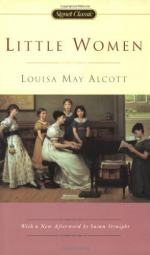Jo couldn’t even lose her heart in a decorous manner, but sternly tried to quench her feelings, and failing to do so, led a somewhat agitated life. She was mortally afraid of being laughed at for surrendering, after her many and vehement declarations of independence. Laurie was her especial dread, but thanks to the new manager, he behaved with praiseworthy propriety, never called Mr. Bhaer ‘a capital old fellow’ in public, never alluded, in the remotest manner, to Jo’s improved appearance, or expressed the least surprise at seeing the Professor’s hat on the Marches’ table nearly every evening. But he exulted in private and longed for the time to come when he could give Jo a piece of plate, with a bear and a ragged staff on it as an appropriate coat of arms.
For a fortnight, the Professor came and went with lover-like regularity. Then he stayed away for three whole days, and made no sign, a proceeding which caused everybody to look sober, and Jo to become pensive, at first, and then—alas for romance—very cross.
“Disgusted, I dare say, and gone home as suddenly as he came. It’s nothing to me, of course, but I should think he would have come and bid us goodbye like a gentleman,” she said to herself, with a despairing look at the gate, as she put on her things for the customary walk one dull afternoon.
“You’d better take the little umbrella, dear. It looks like rain,” said her mother, observing that she had on her new bonnet, but not alluding to the fact.
“Yes, Marmee, do you want anything in town? I’ve got to run in and get some paper,” returned Jo, pulling out the bow under her chin before the glass as an excuse for not looking at her mother.
“Yes, I want some twilled silesia, a paper of number nine needles, and two yards of narrow lavender ribbon. Have you got your thick boots on, and something warm under your cloak?”
“I believe so,” answered Jo absently.
“If you happen to meet Mr. Bhaer, bring him home to tea. I quite long to see the dear man,” added Mrs. March.
Jo heard that, but made no answer, except to kiss her mother, and walk rapidly away, thinking with a glow of gratitude, in spite of her heartache, “How good she is to me! What do girls do who haven’t any mothers to help them through their troubles?”
The dry-goods stores were not down among the counting-houses, banks, and wholesale warerooms, where gentlemen most do congregate, but Jo found herself in that part of the city before she did a single errand, loitering along as if waiting for someone, examining engineering instruments in one window and samples of wool in another, with most unfeminine interest, tumbling over barrels, being half-smothered by descending bales, and hustled unceremoniously by busy men who looked as if they wondered ’how the deuce she got there’. A drop of rain on her cheek recalled her thoughts from baffled hopes to ruined ribbons. For the




